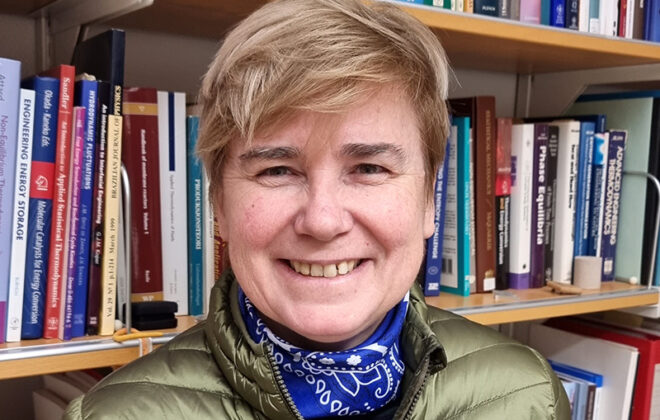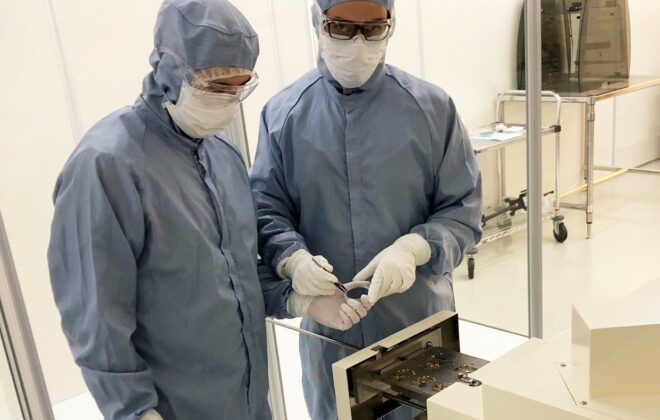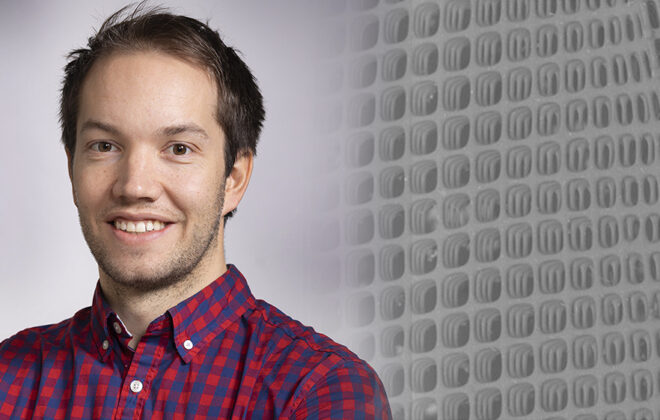Running the nanomaterials lab: Q&A with Ingrid Hallsteinsen
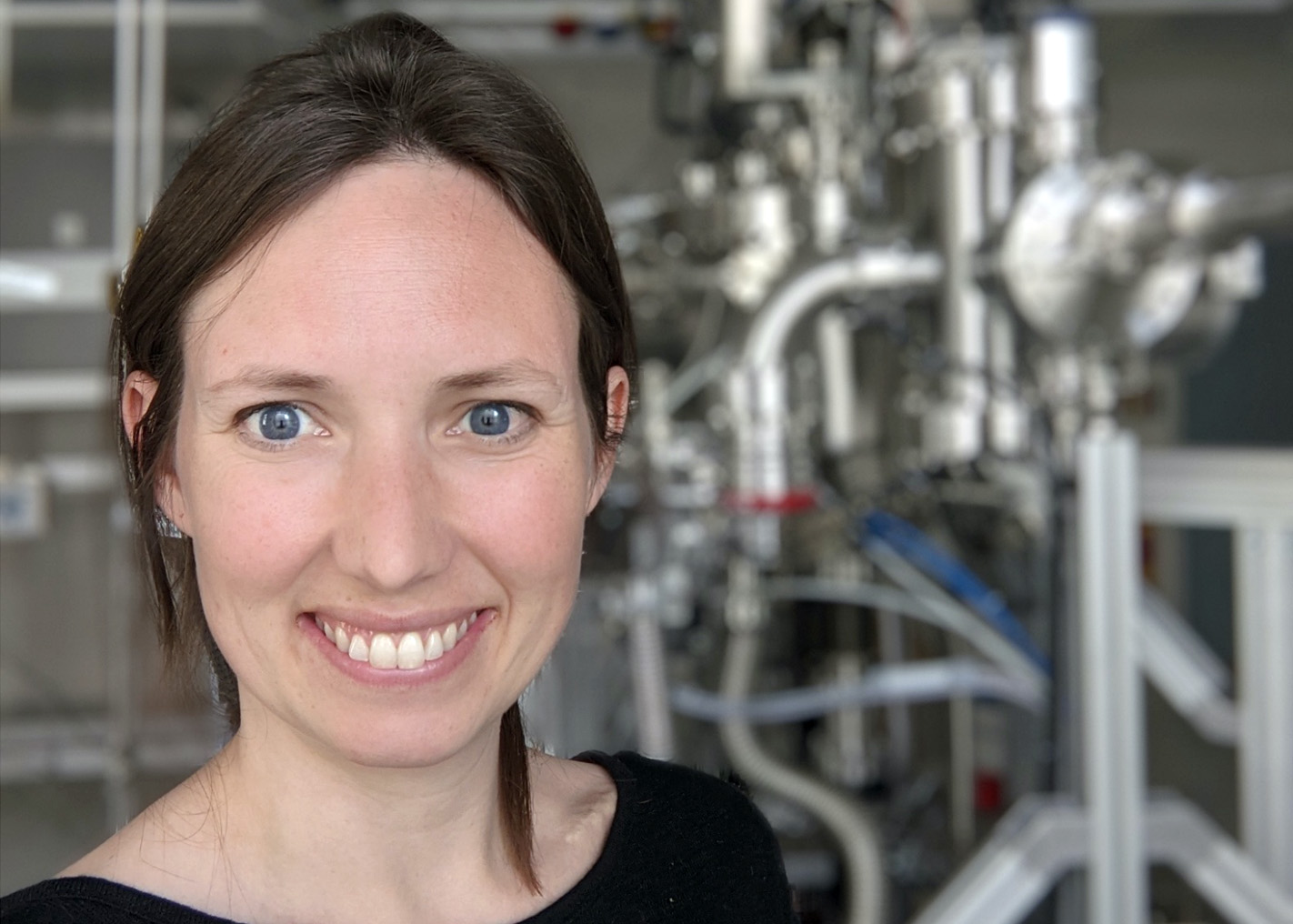
Ingrid Hallsteinsen is an associate professor at the Department of Materials Science and Engineering. She joined NTNU in November 2020.
What do you do at NTNU?
I’m running a laboratory that is focused on the fabrication of nanomaterials. We’re going to be creating new materials by growing thin films, alternating layers of different materials. I’m looking at the interfaces between these layers and how we can use them to design the material’s properties, focusing on magnetism.
Can you sum up your research in five key words?
Controlling electrons at material interfaces.
What was your last paper about?
It looks at how something known as strain affects the functional properties of a material. By growing a material on different substrates, we can see how small disturbances in the atomic position will change the magnetic properties.
As we change the position of the atoms, we change the interaction of the outer electrons which are responsible for the magnetic properties. Basically, we’re looking at how electrons are negotiating: ‘There’s an electron over there. Are we sharing the same space or are we not sharing the same space?’
I was a co-author with colleagues at North Carolina State University, and others in the US, and the paper was published in Physical Review B.
What motivates you?
I like understanding how things are connected. It’s fascinating to see that how electrons interact with each other relates to something that we can actually see and work with like magnetism. That connection, for me, is more motivating than what you’re going to use a material for.
What’s your background?
I grew up in Trondheim and did my undergraduate degree and PhD at NTNU. Most recently I worked as a postdoc for two years at the Advanced Light Source in the Lawrence Berkeley National Lab in California, following a one year residency there during my PhD.
I met my husband at Berkeley and after the postdoc moved to Salt Lake City, where he lived, and applied for a green card. In February last year there was a week in which I got my green card, then the offer for the position at NTNU, and our daughter was born!
Why did you choose NTNU?
We decided to move to Norway because this was my dream position. Also, I really like the collaborative culture at NTNU. You walk down the corridor and there are so many people that want to talk.
I think having NTNU NanoLab ignites not only research that can be done at NanoLab, but further collaboration on the nanoscale. What I loved when I studied nanotechnology as an undergraduate was that it wasn’t just physics, or chemistry, or biology – it was free from those limitations. We are connected by the fact that we look at small things. You immediately get different types of people with different backgrounds.
You walk down the corridor and there are so many people that want to talk
What are you planning to do at NTNU?
I’m planning to expand my research into interfaces between different materials. There are many ways to do that, but one of them is going to be looking at the interface between complex oxides and 2D materials – not graphene, but materials that are similar.
There are a lot of different possibilities for more collaboration – in the physics department with QuSpin (the Centre for Quantum Spintronics), for example, and also Nanolab. I have a PhD student starting in the fall and he’s going to be spending a lot of time in Nanolab. I’m excited about the people he will meet there.
What do you enjoy most about your research?
The feeling of when you have found something unexpected. In experimental work there are surprises – you think you are doing one thing and suddenly you come up with something different. It’s easy to say, ‘Oh, it wasn’t what I thought, let’s do it again.’ But I think the important part is to think: ‘Wait, what happened here?’
Has anything surprised you recently?
I’ve been focussed on developing my group, and I’ve been surprised by how often I get surprised, when conducting interviews, for example, and seeing how people think. You can ask someone a question and the answer is something completely different to what you thought they would say.
What do you like to do in your spare time?
During the pandemic, my husband and I have gotten into watching YouTube videos of people making these small little dioramas, of things like nature scenes or houses. I was very sceptical at first, but it’s so interesting. We’ve also tried to do a little bit ourselves – it’s nice to make something that you can hold in your hand.
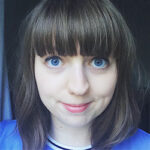
Kelly Oakes
Kelly Oakes is writing science articles for NTNU Nano. She is a freelance writer and editor living in London.
Tags In
Search
Søk
Categories
- Arctic Research
- Arkitektur
- Bærekraft
- Bioingeniørfag
- Biologi
- Biology
- Biomedical Laboratory Science
- Biotechnology
- Bioteknologi
- Chemical Engineering
- Chemistry
- Climate
- Computer Science
- Datateknologi
- Digital
- Elektronikk
- Energi
- Energi
- Energy
- Engineering
- Engineering
- Environment
- Food Science
- Forskning
- Fysikk
- Fysikk
- Havbruk
- Informasjonsteknologi
- Informasjonsteknologi
- Ingeniørvitenskap
- Kjemi
- Kjemisk prosessteknologi
- Kjemisk prosessteknologi
- Kreftbehandling
- Kybernetikk
- Marine Technology
- Materialer
- Materials Science
- Materialteknologi
- Matvitenskap
- Meninger
- Miljø
- Min ph.d.
- My PhD
- My PhD
- My postdoc
- Nanotechnology
- Nanoteknologi
- Ocean
- Oil and gas
- Physics
- Research
- Simulering og visualisering
- Spør en forsker
- Studentliv
- Sustainability
- Ukategorisert
- Universitetsliv
- University Life
Kategorier
- Arctic Research
- Arkitektur
- Bærekraft
- Bioingeniørfag
- Biologi
- Biology
- Biomedical Laboratory Science
- Biotechnology
- Bioteknologi
- Chemical Engineering
- Chemistry
- Climate
- Computer Science
- Datateknologi
- Digital
- Elektronikk
- Energi
- Energi
- Energy
- Engineering
- Engineering
- Environment
- Food Science
- Forskning
- Fysikk
- Fysikk
- Havbruk
- Informasjonsteknologi
- Informasjonsteknologi
- Ingeniørvitenskap
- Kjemi
- Kjemisk prosessteknologi
- Kjemisk prosessteknologi
- Kreftbehandling
- Kybernetikk
- Marine Technology
- Materialer
- Materials Science
- Materialteknologi
- Matvitenskap
- Meninger
- Miljø
- Min ph.d.
- My PhD
- My PhD
- My postdoc
- Nanotechnology
- Nanoteknologi
- Ocean
- Oil and gas
- Physics
- Research
- Simulering og visualisering
- Spør en forsker
- Studentliv
- Sustainability
- Ukategorisert
- Universitetsliv
- University Life

